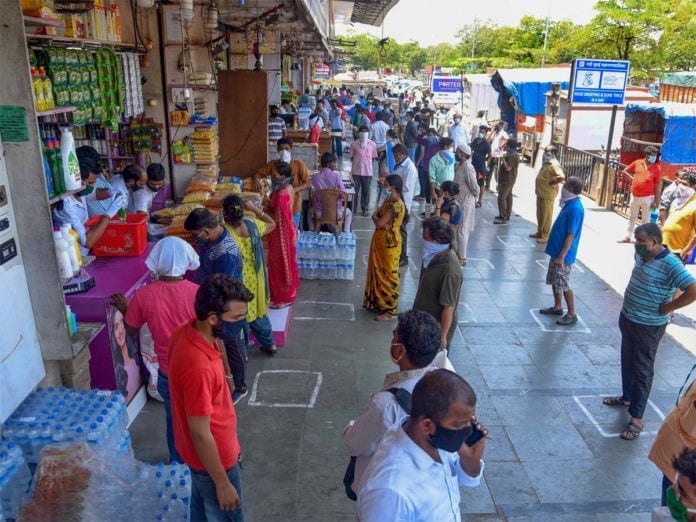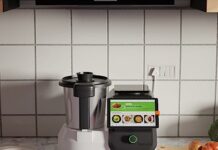The Ministry of Health and Family Welfare issued standard operating procedures on Thursday to contain the further spread of coronavirus by ensuring social distancing. The Centre has allowed the reopening of malls, hotels, restaurants, and places of worship from June 8.
People who are above the age of 65 years and other immune-compromised individuals are still advised to not leave home. The Center, in its May 30th order, empowered the states to put suitable restrictions or prohibit certain activities if it seems necessary to prevent the spread of coronavirus.
Table of Contents
SOPs FOR RELIGIOUS PLACES
The religious places which fall in the containment zones shall remain closed. Only those places will be allowed to open which fall out of the containment zone.
IT SHOULD BE ENSURED BY ALL RELIGIOUS PLACES THAT:
• The entrance must have a sanitizer dispenser and provisions for thermal screening.
• Only those persons should be allowed in the premises who are asymptomatic.
• Entry will be allowed only if the person is using a face cover/face mask.
• Posters about the spreading of coronavirus to be displayed prominently. To spread awareness and about the preventive measures, the audio and video clips must be played regularly.
• If it is possible, the staggering of visitors should be done.
• Preferably, shoes/footwear should be taken off inside the vehicle. Otherwise, they should be kept in separate slots by the person themselves.
• Social distancing must be followed in the parking lots and outside the premises.
• All the shops, stalls, cafeteria, etc. inside or outside the premises must follow social distancing.
• To manage the queue, specific markings may be made with sufficient distance in between.
• Separate entry and exit points for visitors might be introduced.
• Whenever queuing up for an entry, maintain physical distancing of a minimum of 6 feet.
• Before entering the premises, people should wash their hands and feet with soap and water.
• Adequate social distancing should be maintained in seating arrangements too.
• The guidelines of CPWD, for air conditioning/ventilation, states that the temperature of all air conditioning devices should be between 24-30oC. The relative humidity should be between 40-70%. The intake of fresh air should be maximum. The people are not allowed to touch the statues of idols, etc.
• It is prohibited to gather a large congregation.
• Choir or singing groups should not be allowed. As far as it is feasible, recorded devotional songs must be played.
• While greeting each other, avoid physical contact.
• Devotees should bring their own prayer mats and common prayer mats must be avoided.
• The physical offerings of prasad, a sprinkling of holy water is prohibited inside the religious place.
• Social distancing must be followed in community kitchens/langars, etc.
• Sanitation within the premises must be followed with a specific focus on the maintenance of lavatories, hand, and foot washing areas/stations.
• The management of the religious place must frequently clean and disinfect the religious place.
• The floors should be cleaned multiple times within the premises.
• It should be ensured that there is proper disposal of face covers/masks/gloves which are leftover by visitors or by employees.
• In case a confirmed or suspected case is there in the premises:
1. Place the ill person in an isolated room.
2. A mask must be provided to that person until examined by a doctor.
3. The nearest medical facility or the state or district helpline must be informed.
4. The designated public health authority will undertake a risk assessment to initiate the management of his case and the need for disinfection.
5. If the person is found positive, the entire premises must be disinfected.
SOPs FOR RESTAURANTS
The restaurants which lie in the containment zones shall remain closed. Only those will open which lie outside the containment zone.
THE FOLLOWING ARRANGEMENTS MUST BE ENSURED BY ALL THE RESTAURANTS:
• Instead of dine-in, takeaways should be encouraged. The food packet must be left at the customer’s door by the food delivery personnel. The packet should not be handed over directly.
• Prior to home deliveries, the staff assigned for this purpose must be screened thermally by the restaurant authorities.
• The entrance should have a sanitizer dispenser and provisions for thermal screening.
• Only those staff and patrons will be allowed who are asymptomatic.
• The masks are always to be worn by the staff and patrons.
• If possible, the staggering of patrons must be done.
• To ensure social distancing norms, adequate manpower must be deployed by the restaurant management.
• Those employees who are at a higher risk should take extra precautions.
• Social distancing must be followed in the parking lots and outside the premises.
• Social distancing must be followed when people are made to sit in the designated waiting area.
• Valet parking should be operational only with those staff who wear face masks.
• To manage the queue, specific markings may be made with sufficient distance in between.
• Separate entry and exit points for visitors might be introduced.
• Proper disinfection must be organized for the supplies, inventory goods.
• Whenever queuing up for an entry, maintain physical distancing of a minimum of 6 feet.
• Adequate social distancing should be maintained in seating arrangements too. Only 50% of the seating capacity to be utilized inside the restaurant.
• It is advised that disposable menus be used.
• The use of a good quality paper napkin is suggested in place of cloth napkins.
• Social distancing should be followed even in buffet service.
• Social distancing norms must be followed inside the elevator too.
• The use of escalators must be encouraged with one person on alternate steps.
• The guidelines of CPWD, for air conditioning/ventilation states that the temperature of all air conditioning devices should be between 24-30oC. The relative humidity should be between 40-70%. The intake of fresh air should be maximum.
• It is prohibited to gather a large congregation.
• Sanitation within the premises must be followed with a specific focus on the maintenance of lavatories, hand, and foot washing areas/stations.
• Cleaning of frequently touched surfaces and regular disinfection must be made mandatory in all common areas.
• It should be ensured that there is proper disposal of face covers/masks/gloves which are leftover by visitors or by employees.
• Hand gloves must be worn by waiters/staff along with masks.
• Digital mode of payment along with the contact-less mode of ordering should be encouraged.
• Each time a customer leaves, the table must be sanitized.
• Inside the kitchen, social distancing norms must be followed.
• In case a confirmed or suspected case is there in the premises:
1. Place the ill person in an isolated room.
2. A mask must be provided to that person until examined by a doctor.
3. The nearest medical facility or the state or district helpline must be informed.
4. The designated public health authority will undertake a risk assessment to initiate the management of his case and the need for disinfection.
5. If the person is found positive, the entire premises must be disinfected.
SOPs FOR OFFICES
Those offices which lie in the containment zone must remain closed and only those will remain open which lie outside the containment zone.
POST LOCKDOWN: FOOD DELIVERY COMPANIES SEEMS TO MEET OBSTACLES, DESPITE REOPENING OF RESTAURANTS
THE FOLLOWING MEASURES MUST BE UNDERTAKEN BY ALL THE OFFICES:
• The entrance should have a sanitizer dispenser and provisions for thermal screening.
• Only those staffs and patrons will be allowed who are asymptomatic.
• Any staff who resides in a containment zone must inform the supervisory officer and should not attend office. He should be allowed to work from home, and it will not be counted as a leave period.
• Social distancing must be followed by drivers. It should be ensured that those drivers who reside in containment zones should not be allowed to drive vehicles.
• The vehicle’s interiors should be disinfected.
• Those employees who are at a higher risk should take extra precautions.
• The masks are always to be worn by the staff and patrons.
• Video conferencing should be used to conduct meetings.
• Posters about the spreading of coronavirus to be displayed prominently. To spread awareness and about the preventive measures, the audio and video clips must be played regularly.
• As far as feasible, the staggering of lunch hours etc. should be practiced.
• Social distancing must be followed in the parking lots and outside the premises.
• Valet parking should be operational only with those staff who wear face masks.
• All the shops, stalls, cafeteria, etc. inside or outside the premises must follow social distancing.
• To manage the queue, specific markings may be made with sufficient distance in between.
• Separate entry and exit points for visitors might be introduced.
• Cleaning of frequently touched surfaces and regular disinfection must be made mandatory in all common areas.
• Proper disinfection must be organized for the supplies, inventory goods.
• Social distancing must be followed in the seating arrangements.
• Social distancing norms must be followed inside the elevator too.
• The guidelines of CPWD, for air conditioning/ventilation states that the temperature of all air conditioning devices should be between 24-30oC. The relative humidity should be between 40-70%. The intake of fresh air should be maximum.
• It is prohibited to gather a large congregation.
• Sanitation within the premises must be followed with a specific focus on the maintenance of lavatories, hand, and foot washing areas/stations.
• It should be ensured that there is proper disposal of face covers/masks/gloves which are leftover by visitors or by employees.













